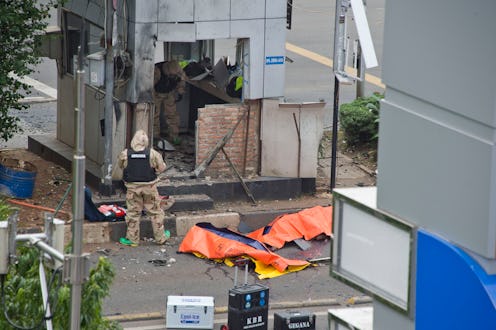News
The Jakarta Attackers May Have ISIS Connections
Attacks in Indonesia Thursday left at least seven dead — five of them assailants, police said, pointing toward an organized group of attackers. Police claimed the Jakarta attackers were likely connected to the ISIS, though the group had yet to claim responsibility. Furthermore, they told the Associated Press that the attack "imitated the terror actions in Paris." Police had received a warning in November from ISIS that an attack would occur in the Indonesian capital.
A spokesman for the national police, Gen. Anton Charliyan, said the assailants had used grenades and guns, and at least one had been on a motorcycle. Many media outlets originally reported that only three of the dead were attackers. Of the four others, three of the deaths were reported to be civilians, and one a police officer. The shooting appeared to target a traffic police post in an area with American eateries, among them Burger King and Starbucks, which had been damaged by explosions — as many as six — at around 10:30 a.m. local time.
Indonesian newspaper Metro posted photos of a gunman shooting at officers before being killed himself. The photos are from a busy intersection, matching the description of the shooting. The attack occurred in one of the busiest areas of the city, just blocks from the United Nations building and near a shopping mall and hotel. The American embassy warned Americans to avoid the area.
This is not the first terrorist attack in Jakarta. In 2009, eight people were killed and at least 50 were wounded in the coordinated bombings of two hotels, the JW Marriott and the Ritz-Carlton. An Indonesian militant group with ties to al Qaeda was blamed.
If this is the work of ISIS, then it is the group's first attack in the majority-Muslim country of nearly 250 million. In December, the Australian attorney general told an Australian paper that ISIS had its eyes on Indonesia for the establishment of a "distant caliphate." “ISIS has ambitions to elevate its presence and level of activity in Indonesia, either directly or through surrogates," AG George Brandis told The Australian.
Also in December, nine suspected terrorists were arrested for allegedly planning attacks on Sumatra, Kalimantan, and Java, the island where Jakarta is. Paperwork with the men suggested they were planning "to do a concert" — interpreted by police to mean to carry out an attack with possible suicide bombers. A map of Jakarta along with bomb-making materials were seized in raids across the country. Police had said the men arrested were just foot soldiers, and that the leaders were still on the loose.
Despite the Australian AG's warnings and the recent arrests, the number of Indonesians heading off to fight for ISIS — or later returning home — is relatively small. The Atlantic ran a piece earlier in January looking at the recruiting of ISIS militants in Indonesia, arguing that comparatively few came from the country. Reuters reported somewhere between 100 and 300 have returned from Syria — including women and children.
Unfortunately, as seen in France and San Bernardino, an attack can still happen, no matter what the level of support ISIS sees.
